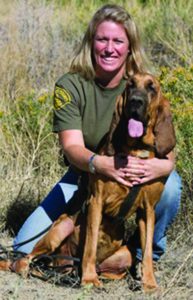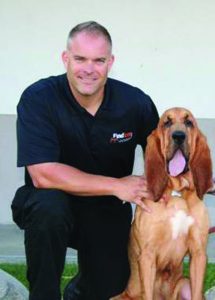Scent. Every individual has their own unique scent that is as different from person to person as fingerprints. Humans can’t distinguish individual scents. We are aware of odors, good and bad, from dirt and sweat to too much perfume or cologne. But dogs, particularly hounds, know you by your scent well before they recognize you by sight. Bloodhounds are the best at scent detection and are usually the ones we see on TV participating in rescue or missing person operations.
An eighth of a dog’s brain is dedicated to smell, with an olfactory bulb that weighs about 6 grams as opposed to a human’s, which weighs about 1.5 grams. We have 50 million scent cells per square inch in our nose, which seems like a lot, but your dog has more than 220 million per square inch! Our entire olfactory area is ½ square inch, whereas a bloodhound’s is almost 20 square inches.
The Find Me Foundation is a non-profit organization who’s mission is to help families or organizations collect scents from at-risk individuals and store it in their home to be used later for a dog to track their missing or lost love one should that ever occur.
Who is at risk?
Children with Autism or Aspergers. According to the National Autism Association, nearly half of children with autism engage in wandering or bolting behavior. Other children may live in “at-risk” neighborhoods where child abductions can happen. Abductions can happen anywhere and a child goes missing every forty seconds!
Senior Citizens with Alzheimers or Dementia. Whether at home or in a senior living facility, six in ten people will dementia will wander away from their environment. A person with Alzheimer’s may not remember his or her name or address and become disoriented—even in familiar places.

The Find Me Foundation was started by two police officers, Dr. Coby Webb and Travis Shows. Coby has an extensive background of raising and training bloodhounds for search and rescue missions and is on the first call list for the FBI to provide tracking dogs. In their years of experience they come across the same problem—finding a specific item with that persons’ individual scent.
“It’s just like a snowflake or a fingerprint—there’s no two alike,” said Shows. “If you don’t have a good item to give the dog you can’t get that good start, and without a good start you’re not going to have success.” “I do the laundry in my house. My scent is on everything,” adds Webb. “So, if one of my children went missing, the dog wouldn’t know who to track and that would be the error.”

When a person disappears, there’s no time for error. The first three hours of the search are the most crucial. “We don’t have time as handlers to get the call, realize that somebody’s missing, go to the potential house or wherever that person’s missing from and then try to rule out what item we could possibly use for that dog team to get started,” said Shows.
So the pair came up with a way to avoid wasting that valuable time. They created the Find’em Scent Kit. It takes about five minutes to complete the kit and collect your scent. It then goes in the freezer, where it stays good for up to one year. In the event that one of your loved ones goes missing, your registered Find’em Scent Kit will provide a K9 team with a pure, uncontaminated article that will help them locate that loved one quickly.
For more information, visit The Find Me Foundation website at thefindmefoundation.org.


